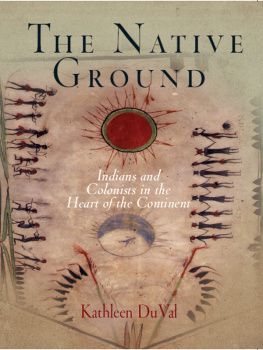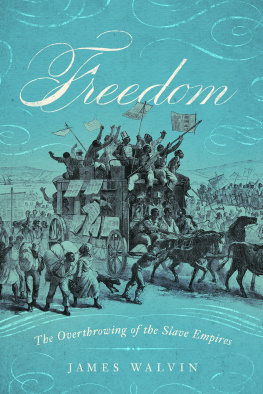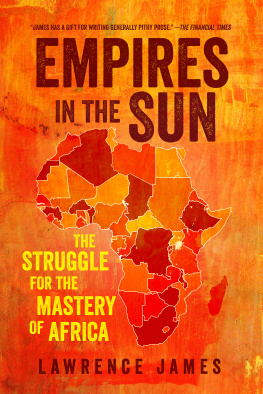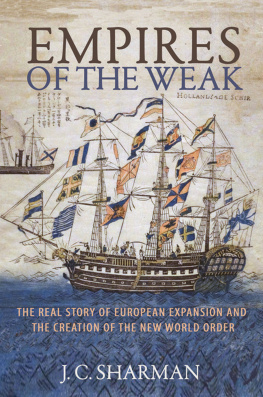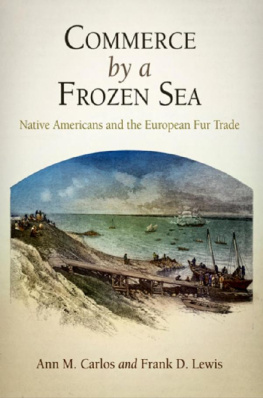Acknowledgments
This book is the integration of thoughts and ideas I have accumulated over many years, beginning with involvement in a World Civilization course at the University of California, San Diegos Eleanor Roosevelt College as far back as the late 1980s. An earlier effort to make sense of global trends in the Early Modern era, combined with the limitations inherent in teaching World Civilization as part of an interdisciplinary faculty committee, brought home to me the pervasiveness of Euro-centrism in the teaching of world history. The book itself is the product of many years of reading and of teaching world history with both undergraduates and graduate students. Any mistakes or misunderstandings, however, are my own.
I am grateful to my colleagues in the History Department at UCSD, where I taught for thirty-four years, and to the universitys Research Committee. My colleagues provided valuable critiques of parts of the manuscript, while the department, by allowing me to introduce the occasional unconventional course, helped open new perspectives on established narratives. UCSD, meanwhile, provided sabbatical leaves at helpful moments, and the Research Committee provided several timely travel grants.
I am also indebted to two other great institutions: the National Humanities Center in Research Triangle Park, North Carolina, and the Rockefeller Foundation. At a critical time in the development of this book, the National Humanities Center awarded me a yearlong research fellowship that provided time to read, reflect, and write. Surrounded by scholars from several branches of the Humanities, my approach to the project was enriched in many ways. Sometime later, the Rockefeller Foundation awarded me a residential fellowship at their Research and Conference Center in Bellagio, Italy. The foundations Villa Serbellone, which overlooks the picturesque town of Bellagio and Lake Como, was a uniquely peaceful setting. Its regular seminars, in fields as diverse as Neurology and Developmental Economics, enriched my approach to the evolving book.
The two anonymous reviewers solicited by Rowman & Littlefield provided long, thoughtful, and exacting critiques of the manuscript. They will find that, thanks to their suggestions, the book is much changed and significantly better. My thanks to both of you.
Without a sense of geography, World History can be frustrating to both the reader and the author. My attempt to overcome that problem is embodied in the twenty-one maps scattered throughout the book. The credit for these maps goes, without reservation, to Mack Carlisle, MFA, of Portland, Oregon. Macks keen intelligence and remarkable computer graphics skills produced a set of maps that make the geographic dimensions of this essay manageable to any reader.
Finally, I am deeply indebted to the Maritime Museum of San Diego and its welcoming crew of volunteer docents; its director, Dr. Ray Ashley; and its executive director, Susan Sirota, creator of the museums remarkable education program. This museum and its unique collection of ten historic vesselsmost of them seaworthyhave provided space for a post-retirement career that includes this book and the Robert and Laura Kyle Chair in Maritime History. It is not enough to write history for a few hundred academic colleagues; it is also important to make it accessible to the rest of society.
Footnote
* David Ringrose, Expansion and Global Interaction: 12001700 (New York, 2000).
EXPLORING WORLD HISTORY
Series Editors
John McNeill, Georgetown University
Kenneth Pomeranz, University of Chicago
Jerry Bentley, founding editor
Plagues in World History
by John Aberth
Crude Reality: Petroleum in World History, Updated Edition
by Brian C. Black
The Age of Trade: The Manila Galleons and the Dawn of the Global Economy
By Arturo Giraldez
The Struggle against Imperialism: Anticolonialism and the Cold War
by Edward H. Judge and John W. Langdon
Smuggling: Contraband and Corruption in World History
by Alan L. Karras
Europeans Abroad, 14501750
by David Ringrose
The First World War: A Concise Global History, Second Edition
by William Kelleher Storey
Insatiable Appetite: The United States and the Ecological Degradation of the Tropical World, Concise Revised Edition
by Richard P. Tucker
Bibliography
Abreu, Darlene, The Cod Trade in Early-Modern Portugal: Deregulation, English Domination, and the Decline of Female Cod Merchants. PhD Dissertation, Memorial University of Newfoundland, 1995.
Abu-Lughod, Janet, Before European Hegemony: The World System AD 12501350 (New York, 1989).
Adorno, Rolena, The Intellectual Life of Bartolom de las Casas (New Orleans, 1991).
Aghassian, Michel, and Kram Kvonian, Armenian Trade in the Indian Ocean in the Seventeenth and Eighteenth Centuries, in Lombard and Aubin, Asian Merchants and Businessmen.
Alam, Muzaffar, and Sanjay Subrahmanyam, eds., The Mughal State, 15261750 (Delhi, 1998).
Alden, Dauril, Changing Jesuit Perceptions of the Brasis During the Sixteenth Century, Journal of World History 3 (1992): 20518.
Alencastro, Luiz Felipe de, The Economic Network of Portugals Atlantic World, in Bethencourt and Ramada Curto, Portuguese Oceanic Expansion, pp. 10333.
Ali, Omar H., The African Diaspora in the Indian Ocean, Schomburg Center for Research in Black Culture, New York Public Library, n.d.
Allen, Richard B., European Slave Trading in the Indian Ocean, 15001850 (Athens, OH, 2014).
Altman, Ida, Spanish Women in the Caribbean, 14931540, in Owens and Managan, eds., Women of the Iberian Atlantic (Baton Rouge, LA, 2012), pp. 4458.
Ames, Glenn J., The Carreira da India, 16681682: Maritime Enterprise and the Quest for Stability in Portugals Asian Empire, The Journal of European Economic History 20 (1991): 728.
Ames, Glenn J., Vasco da Gama: Renaissance Crusader (New York, 2005).
Andaya, Leonard, Interactions with the Outside World and Adaptation in Southeast Asian Society, in Tarling, ed., The Cambridge History of Southeast Asia, vol. 2, pp. 1825.
Anderson, Benedict, Imagined Communities: Reflections on the Origin and Spread of Nationalism (London, 1991).
Anderson, J. L., Piracy and World History: An Economic Perspective on Maritime Predation, Journal of World History 6 (1995): 175200.
Andrade, Tonio, Lost Colony: The Untold Story of Chinas First Great Victory over the West (Princeton, NJ, 2011).
, The Companys Chinese Pirates: How the Dutch East India Company Tried to Lead a Coalition of Pirates to War Against China, 16211662, Journal of World History 15 (2004): 41543.
Antony, Robert, Pirates in the Age of Sail (New York, 2007).
Antunes, Ctia, Cross-Cultural Business Cooperation in the Dutch Trading World, 15801776: A View from Amsterdams Notarial Contracts, in Trivellato, Halevi, and Antunes, eds., Religion and Trade, pp. 15068.
Antunes, Ctia, and Filipa Ribeiro da Silva, Cross-Cultural Entrepreneurship in the Atlantic: Africans, Dutch and Sephardic Jews in Western Africa, 15801674, Itinerario 35 (2011): 4976.
Antunes, Ctia, and Jos Gommans, eds., Exploring the Dutch Empire: Agents, Networks and Institutions, 16002000 (London, 2015).
Arasaratnam, S., Merchants of Coromandel in Trade and Entrepreneurship circa 16501700, in Ptak and Rothermund, eds., Emporia, Commodities and Entrepreneurs in Asian Maritime Trade, c 14001750


